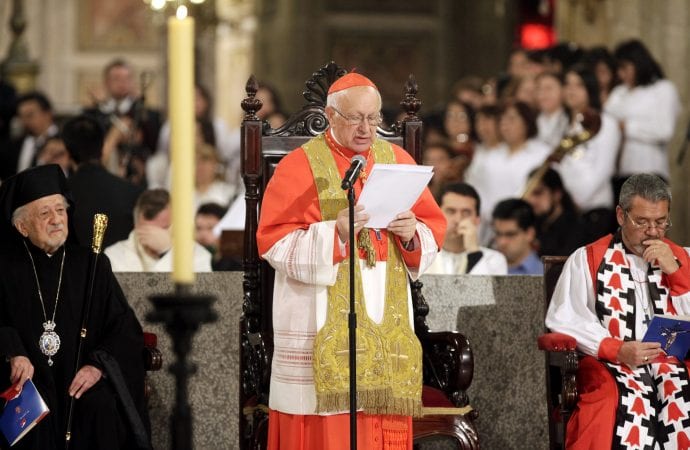Pope Francis has accepted the resignation of Chilean Cardinal Ricardo Ezzati, Archbishop of Santiago, who’s been subpoenaed by a local prosecutor’s office to testify over allegations that he covered up for cases of clerical sexual abuse.
Ezzati’s resignation came on Saturday and was announced by the Vatican’s press office.
To replace him, the pontiff tapped Bishop Celestino Aós Braco, of Copiapó, as Apostolic Administrator “sede vacante et ad nutum Sanctae Sedis.”
As was the case with the other seven Chilean bishops whose resignations Francis accepted in the past year, the Vatican failed to provide an official explanation for Ezzati’s departure, though it’s widely understood that it has to do not only with his age, as he’s over 75, the mandatory age for bishops to offer their resignation, but also with his role in the country’s massive clerical abuse scandals.
He’s one of eight Chilean bishops under investigation by the prosecutor’s office on charges of either cover-up or abuse. Earlier this moth it also became public that he together with the archdiocese have been sued for $500,000 for covering up a case of rape that allegedly took place in a bedroom of the local cathedral.
Aós Braco is a Spaniard, but has been in Chile since 1983. He’s a Capuchin, a psychologist and served in various roles at different Church tribunals in Chile over the past decades.
The other resigned bishops include Juan Barros, former bishop of Osorno, who’s long been accused of covering up for Fernando Karadima, found guilty of sexual abuse but also abuses of conscience and power. On the same day, the pontiff accepted the resignation of Bishop Gonzalo Duarte, of Valparaiso, who’s accused not only of cover-up but of abusing seminarians himself.
Although much of the attention on the Chilean crisis had been focused on Barros since 2015, who at the time was moved by Francis from the military chaplaincy to Osorno, a report commissioned by the pope found the problem goes much further.
The 2,300-page dossier, produced by Maltese Archbishop Charles Scicluna and Spanish Father Jordi Bertomeu, led the pope to shift from defending Barros in public last January to acknowledging he’d been wrong. Since that first report, which he got in April, Francis has held several meetings with Chileans, including two encounters with survivors, in addition to the one with the 34 bishops.
In a document distributed to the bishops and later leaked to Chilean media, the pope had hinted that he was going to remove people from positions of authority, “This - and I say this clearly - must be done, but it’s not enough, we must go further.”
Francis also wrote that the “special mission” of Scicluna and Bertomeu was designed to “help find the light to adequately treat an open wound, one which hurts and is complex, and which for a long time hasn’t stopped bleeding in the lives of so many people, and as such, in the life of the People of God.”
In the footnotes of the document, Francis didn’t hold back when listing the failures of the Chilean bishops, saying that his envoys confirmed that some clerics guilty of immoral behavior were transferred to other dioceses, with the gravity of their actions “minimized” and attributed to “simple weakness or lack of morality.”
That research, Francis says, also showed mishandling of the allegations, because “in not a few cases” grave indications of a crime “were superficially dismissed as improbable,” and on occasion, evidence was destroyed.
Though Chilean, Ezzati was born in Italy in 1942. At the age of 17 he emigrated to Chile to join the Salesian religious order and went on to do studies in both Chile and Europe before returning to Chile to teach theology.
In 1991, Ezzati was named an official of the Vatican’s Congregation for the Institutes of Consecrated Life and Societies of Apostolic Life, better known as the “Congregation for Religious.” That’s the same Vatican department in which the previous Archbishop of Santiago, Cardinal Francisco Javier Errázuriz Ossa, who’s now under fire for cover-ups of abuse cases, also served.
Both Ezzati and Errázuriz returned to Chile in 1996, Errázuriz as the Archbishop of Valparaíso and Ezzati as Bishop of Valdivia. In 2001, Ezzati became an auxiliary bishop of Santiago de Chile, and in 2006 he became the Archbishop of Concepción.
In 2009, Pope emeritus Benedict XVI appointed Ezzati to serve as one of four apostolic administrators to look into the Legion of Christ after its founder, the late Mexican Father Marcial Maciel Degollado, had been found guilty of a wide range of sexual abuse and misconduct. Then, in 2010, Ezzati was named the Archbishop of Santiago.

